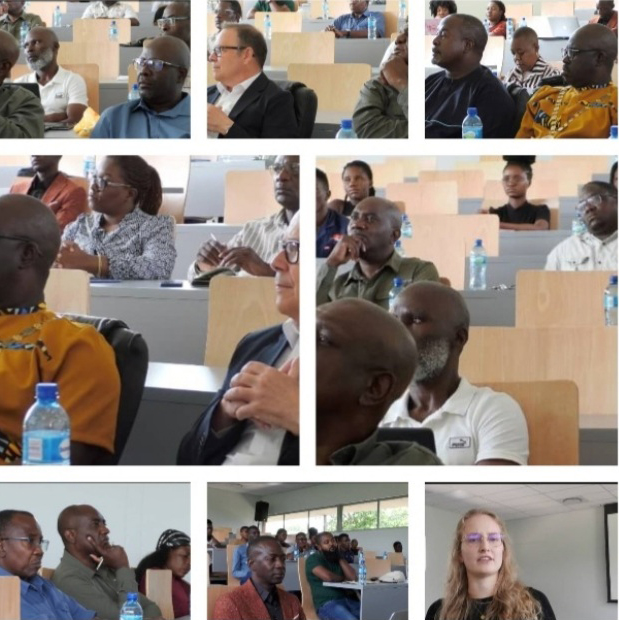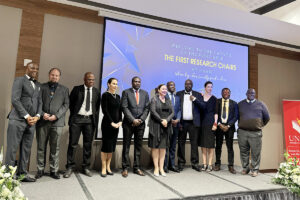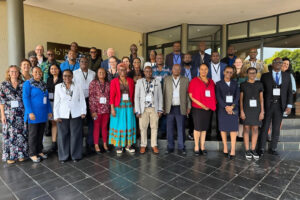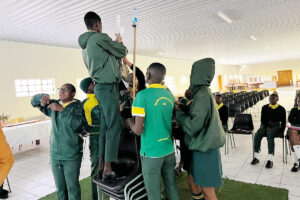The University of Namibia (UNAM), through its Department of Wildlife Management and Tourism Studies in Katima Mulilo, Zambezi Region, recently hosted an impactful research collaboration workshop aimed at transforming the Kavango-Zambezi Transfrontier Conservation Area (KAZA) into a dynamic and sustainable tourism hub. The event brought together key stakeholders, researchers, policymakers, and industry experts to discuss challenges and opportunities in transboundary tourism development.
This workshop was part of a growing collaboration between UNAM’s Department of Wildlife Management and Tourism Studies and the University of Cologne, Germany. The partnership aims to foster research-driven solutions to enhance tourism and conservation efforts in the region.

A Gathering of Visionaries
The workshop commenced with welcoming remarks from distinguished guests, including Dr. Evans Simasiku, Head of the Department of Wildlife Management and Tourism Studies, and Dr. Sam Mafwila, Director of the Katima Mulilo Campus. Their speeches underscored the importance of leveraging research to drive policy reforms that promote regional tourism.
The workshop was further honoured to have esteemed researchers from the University of Cologne, Germany Mr. Mfundo Mlilo and Ms. Leonie Hesselmann who presented groundbreaking studies on transboundary tourism and entrepreneurship.
Unraveling the Challenges of Tourism in KAZA
A core theme of the discussions revolved around the paradox of Zambezi’s tourism potential. Despite its strategic location as a gateway to Botswana, Zambia, Zimbabwe, and Namibia, the region struggles to retain tourists for extended stays. Mr. Mfundo Mlilo’s research provided critical insights into this issue, examining how restrictive visa policies, colonial-era borders, and fragmented ecosystems hinder seamless travel across the region.
His study further revealed that while over $65 million has been invested in conservation and infrastructure, policy misalignment among KAZA member states continues to impede progress. He emphasized the need for harmonized policies and the prioritization of tourism as a sustainable economic pillar.
Entrepreneurship: The Key to Sustainable Growth
Ms. Leonie Hesselmann’s research spotlighted the untapped potential of local entrepreneurs in driving the region’s tourism industry. Shockingly, only 4% of the Zambezi workforce is employed in tourism, with a mere 20% of revenue remaining within local communities. Her findings underscored the necessity of integrating entrepreneurship education within universities and fostering an enabling environment for small businesses.
She further emphasized the role of financial accessibility, land ownership reforms, and targeted mentorship programmes in empowering local youth to become active participants in the tourism sector. Her call to action resonated with stakeholders, inspiring discussions on policies that could facilitate homegrown tourism enterprises.
Transboundary Tourism: Bridging the Gaps
A major highlight of the workshop was the session on transboundary tourism in KAZA, moderated by Dr. Fenny Nakanyete. Mr. Mfundo Mlilo’s comparative study of tourism in Zambezi (Namibia), Chobe (Botswana), and Victoria Falls (Zimbabwe) revealed significant disparities in the exploitation of tourism potential. While Botswana and Zimbabwe have successfully capitalized on their natural assets, Namibia’s Zambezi Region lags due to limited infrastructure and marketing efforts.
His study introduced the Trinity of Change Agency Concept, which emphasizes institutional entrepreneurship, innovative entrepreneurship, and place-based leadership as catalysts for tourism transformation. Stakeholders discussed strategies such as fast-tracking the KAZA UNIVISA, investing in airport and road infrastructure, and diversifying tourism offerings to enhance the region’s competitiveness.
Charting the Way Forward
The workshop concluded with a plenary session that focused on identifying practical steps to enhance the tourism profile of the Zambezi Region. Discussions emphasized the importance of cross-border collaboration through policy harmonization and the need for comprehensive marketing strategies to highlight the region’s unique cultural and ecological assets. Participants also explored the establishment of a regional tourism business council to facilitate cooperation among industry stakeholders. Additionally, encouraging youth participation in tourism was seen as vital, with recommendations for entrepreneurship training and increased funding opportunities. As KAZA continues to develop, such research-driven engagements will be essential in shaping a sustainable and inclusive tourism industry. The UNAM-hosted workshop demonstrated that with effective policies and initiatives, the Zambezi Region can evolve from a gateway into a premier destination in its own right. The workshop concluded with a plenary session where stakeholders deliberated on key takeaways and actionable steps to elevate the Zambezi Region’s tourism profile. Key recommendations included:
- Strengthening cross-border collaboration through policy harmonization.
- Enhancing marketing strategies to showcase Zambezi’s unique cultural and ecological assets.
- Establishing a regional tourism business council to foster cooperation among stakeholders.
- Encouraging youth participation in tourism through entrepreneurship training and funding opportunities.
As KAZA continues to evolve, such research-driven engagements are critical in shaping a sustainable and inclusive tourism industry. The UNAM-hosted workshop set a precedent for future collaborations, demonstrating that with the right policies and initiatives, the Zambezi Region can transform from a mere gateway into a premier destination in its own right.
By Daniel Munyanya an upcoming graduate in Wildlife Management and Tourism Studies. He is a research scientist student, passionate about nature.





